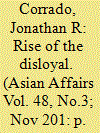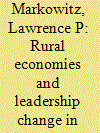|
|
|
Sort Order |
|
|
|
Items / Page
|
|
|
|
|
|
|
| Srl | Item |
| 1 |
ID:
078976


|
|
|
|
|
| Publication |
2007.
|
| Summary/Abstract |
This paper analyzes factors contributing to terrorism, using its initial meaning from the French Revolution in which the state is the terrorist. The independent economic variables are mineral exports/GDP, military expenditures/GDP, real GDP growth, real per capita GDP, and population density, and the dependent variable is democide, the murder of people by government. Analysis of the data indicates that mineral exports and poor economic performance (both level and growth of income) increase the probability of democides. However, once regime type (democracy) is controlled for, only mineral exports remain statistically robust. Therefore, the control of rents seems to be a major factor contributing to democides
|
|
|
|
|
|
|
|
|
|
|
|
|
|
|
|
| 2 |
ID:
152875


|
|
|
|
|
| Summary/Abstract |
It is often noted in resource curse literature that agricultural economies are less conflict-prone than countries managing mobile, high-value resources. In the vast literature linking resource endowment and conflict, cash crop economies are often considered immune to civil violence, believed to stand apart from the many horrific episodes of violence and civil war centered on “lootable” wealth (such as alluvial diamonds, tin, tungsten, or other conflict minerals). But many incidents of violence—especially local violence—are in fact occurring in cash crop economies. Drawing on newspaper accounts, policy analyses, ethnographic interviews, and in-depth reports by international organizations, I examine an episode of local violence in 2010 in Kyrgyzstan. Through this case study, the article provides a better understanding of local violence in cash crop economies that can apply to other weak states.
|
|
|
|
|
|
|
|
|
|
|
|
|
|
|
|
| 3 |
ID:
155114


|
|
|
|
|
| Summary/Abstract |
Why has loyalty to the Kim Family Regime and the Worker’s Party diminished over the past twenty years despite a rise in the average standard of living, greater social mobility, and a regime policy of benign neglect towards marketization? Unthinkable in the Kim Il Sung era, the increase in expressions of resentment toward the North Korean authorities represents a shift in the ideology, behavior, and motivation of the population. Four critical factors have heightened tensions between state and society in North Korea, leading to a reduction in loyalty among the general population. The author considers the impact of labor mobilizations, the declining importance of party membership, the influence of foreign media, and the rise of rent seeking and extractive policies. While all play a role, it is important and possible to identify the primary cause. Extractive policies and rent-seeking position the regime and the people in a directly adversarial relationship. All tiers and agencies of the government have become complicit in efforts to siphon off profits, control market actors through crony capitalism, rent seek, over-regulate, and compete against private market actors, causing the residents to express frustration and resentment towards a government that does not have their interests at heart.
|
|
|
|
|
|
|
|
|
|
|
|
|
|
|
|
| 4 |
ID:
149737


|
|
|
|
|
| Summary/Abstract |
This article applies a political economy approach to questions of presidential succession in Central Asia. Using the cases of Uzbekistan and Kyrgyzstan, it examines how institutions governing rural economies generate, channel and distribute rents within these authoritarian regimes. In some, these institutions concentrate rents under long-standing rulers; in others they diffuse rents away from rulers. The article then specifies obstacles to leadership change that arise from these rural economies, and the crises those obstacles may pose for authoritarian regimes in the region.
|
|
|
|
|
|
|
|
|
|
|
|
|
|
|
|
|
|
|
|
|